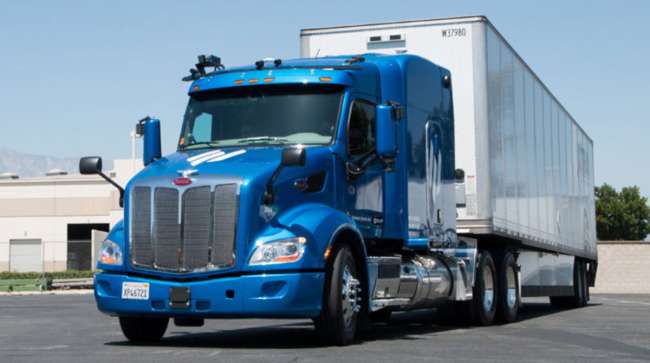Contributing Writer
Embark Posts Wider Loss, Advances Tech Development

[Stay on top of transportation news: Get TTNews in your inbox.]
Autonomous truck developer Embark Technology Inc. issued its first annual and quarterly financial report as a public company, detailing steep losses but significant technology gains and key business partnerships.
In November, the San Francisco company became publicly traded after a merger with Northern Genesis Acquisition Corp 2. It trades under the EMBK ticker symbol. The company generally refers to itself as Embark Trucks.
Embark posted a loss of $76.4 million in the fourth quarter, wider than the $6.7 million loss it posted in the same period a year earlier. The company lost $124.2 million for the full year, compared with $21.5 million in 2020. As a startup, the company had no revenue.

Rodrigues
“Since announcing our business combination with Northern Genesis last June, we further strengthened our partnerships with Tier 1 suppliers and technology providers, including Cummins, Nvidia, ZF, and Luminar,” Alex Rodrigues, Embark’s co-founder and CEO, said in a March 17 conference call with industry analysts and investors.
In February, Embark said it would partner with Alterra Property Group, a real estate investment company, to identify locations to build hubs as transfer points for autonomous trucks. The facilities would be near major trucking lines. Drivers would manage the first- and last-mile transfer of freight to and from the hubs, while autonomous trucks would handle hauling the cargo along the highway system in the Southwest.
The company also plans to offer a direct-to-shipper network in which carriers would move goods directly to and from shipper facilities. The locations and routes will be detailed in Embark’s coverage map to reduce the complexity of autonomous driving.
Did anyone catch us on the Nasdaq Tower in Times Square today?
Embark will share its inaugural earnings report today after market close. $EMBK pic.twitter.com/MD5Z8SMtlY — Embark (@embarktrucks) March 17, 2022
“Our technology stack reflects our focus on trucking, and we believe it’s much more practical for highway driving relative to urban driving,” Rodrigues said.
Waymo, Aurora, TuSimple and other autonomous trucking developers are focusing their initial efforts on establishing networks in the Southwest because of favorable weather and regulatory conditions for the nascent industry.

Host Michael Freeze speaks with TMC Chairman Randy Obermeyer and Brenda Neville of the Iowa Motor Truck Association about how to recruit young drivers and technicians. Hear a snippet above, and get the full program by going to RoadSigns.TTNews.com.
Embark said it has 14,200 reservations for its 2024 commercial launch of its self-driving system, which it calls Embark Driver.
Also in February, Embark launched a so-called Truck Transfer Program with Knight-Swift Transportation Holdings Inc. The motor carrier will own and maintain an Embark-equipped autonomous truck and deploy it with a Knight-Swift driver in the cab. That’s a change from most other autonomous trucking pilot programs. Embark and other autonomous developers typically own, maintain, and dispatch autonomous trucks, using their staff as safety supervisors when hauling freight for carriers and shippers.
Rodrigues said Embark’s strategy is to develop a universal interface that will allow its driving system to be integrated with trucks manufactured by any brand. Motor carriers typically have trucks from multiple manufacturers in their fleet, and like the flexibility of moving from brand to brand based on reliability, technology improvements and vehicle availability. Rodrigues said it doesn’t make sense for Embark to tie itself to one or just a few truck brands.

Houghton
Embark recently named industry veteran executive Stephen Houghton as chief operating officer. Previously, he held positions developing autonomous driving technology at Amazon and Cruise Automation. The company also recently hired former Teamsters government affairs representative Sam Loesche to lead its federal policy effort. Embark said Loesche will “reinforce the company’s labor-friendly go-to-market strategy.”
Embark has expanded operations into Texas, opening a new autonomous trucking hub and launching an autonomous trucking lane between Houston and San Antonio. Embark said the move would accelerate its testing and go-to-market strategy.
“We will deliver this software as a subscription service by partnering with leading carriers who will pay a per-mile subscription fee for Embark driver software, as well as a suite of supporting services,” Rodrigues said.
Embark doesn’t plan to have meaningful revenue until 2024 when it begins to commercialize the service and its software.
The company ended the year with about $265 million in cash and cash equivalents. It expects to spend $125 million to $140 million on its autonomous truck technology development efforts this year.
The company has 18 trucks in its testing fleet.
Want more news? Listen to today's daily briefing below or go here for more info:

